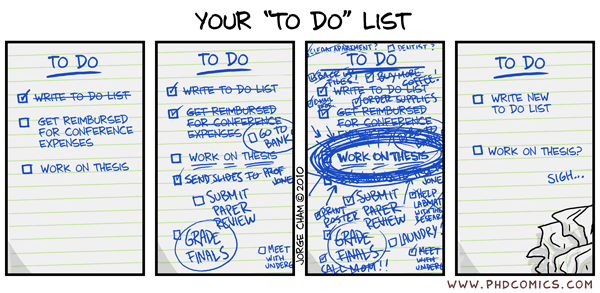*Note: Having been temporarily flattened by my yearly fall cold, I’m putting up a non-geology post that I was working on earlier this month and have just enough energy to finish now. I’ll make it back to talking about andesitic eruption deposits just as soon as I emerge from the haze of cold drugs.
‘Tis the season for the arrival of new grad students (geology and otherwise), and ’tis also time to talk about time. As in, time management – possibly one of the most important skills a grad can have (or develop).
You’ve heard it a lot of other places, but I’ll repeat it here as well: Graduate school isn’t like undergraduate, unless you were part of a crazy tough undergrad department. You’re much more responsible for yourself, including how you portion out your time between classes, research, work (if you happen to be a TA), and downtime. I treat it as a job, because that’s what it should be. And it’s really, really important to know how much time to devote to the different parts of your job – and when to take a break.
Classes will be important, but unlike undergrad, they’re not the biggest part of your life. Most grad programs will expect you to maintain a certain GPA of to remain in the program, but you shouldn’t be working yourself to death over your classes. Eventually, you won’t be taking as many (or any at all), and if you’re not used to working on things other than classwork, it will be harder to adjust. Pace yourself if you can – sometimes you can put off a class that’s not essential to your research.
Likewise, if you’re TAing, remember that the teaching experience is useful – and if you plan to be a professor someday, it may be some of your only training – but that research is your primary mission. Put in the work that you need to, but don’t get sucked into agonizing over grading or class preparation. Ask for help if you need it, from your professor or the other TAs. Don’t get too emotionally invested in it; not every student is going to like you or your teaching style (or their grades).
Research should be the main focus of your time in grad school. Even if you don’t have a solid idea of what you want to work on when you come in, start by doing as much reading as possible (without frying your brain). Use your class projects to help develop (and answer!) research questions. Set daily, weekly and monthly goals for yourself, and keep track of things like conference deadlines and committee meeting dates (they’re good things to schedule your work around). If you have an idea for a research proposal, start writing whatever you can, a little bit at a time – it will save you a lot of work come crunch time. Keep a calendar (or two) to remind you of your appointments; being able to look ahead at a deadline will help you plan out your time better.
And most importantly, remember to take time for your own well-being. It’s really, really easy to get overstressed in grad school. Between teaching, research, writing, taking classes, and dealing with everyday life, you’re going to be really busy. You may well be putting in longer hours than a regular job, just to get things done – and that’s okay. But make sure that you take time off for yourself, because your mental health is just as important as your degree. I feel like I came from a rigorous academic background, and I still had rough patches getting adjusted to grad school; everyone does. But I learned that I had to step away from it and do fun things for myself – hiking, shopping, going out with friends, watching cheesy horror movies, blogging, etc. It’s made the whole experience a lot more enjoyable, and I think that even though grad school is difficult, if you’re not enjoying it on some level, there’s something that needs to change.



 Jessica Ball is a volcanologist at the U.S. Geological Survey, researching volcanic hydrothermal systems and stability, and doing science communication for the California Volcano Observatory. She previously worked at the Geological Society of America's Washington DC Policy Office, learning about the intersection of Earth science and legislative affairs. Her Mendenhall postdoc and PhD focused on how water affects the stability of volcanoes, and involved both field investigations and numerical modeling applications. Her blogging covers a range of topics, from her experiences in academic geosciences to science outreach and communication to her field and lab work in volcanology.
Jessica Ball is a volcanologist at the U.S. Geological Survey, researching volcanic hydrothermal systems and stability, and doing science communication for the California Volcano Observatory. She previously worked at the Geological Society of America's Washington DC Policy Office, learning about the intersection of Earth science and legislative affairs. Her Mendenhall postdoc and PhD focused on how water affects the stability of volcanoes, and involved both field investigations and numerical modeling applications. Her blogging covers a range of topics, from her experiences in academic geosciences to science outreach and communication to her field and lab work in volcanology.
This is really some great advice. When I TA'd, I had to focus quite a bit of time and effort to the class I taught the first year becuase it was so foreign to me (teaching was foreign, not the subject). The second year was easier. Still, having this list for perspective back then would have been helpful!I love those lists at the top with the little checkboxes. Maybe I'll have to start doing that. 😉
Nice Blog. The portuguese Blog Geopedrados – http://geopedrados.blogspot.com/ – has linked your Blog…